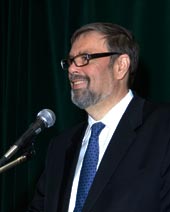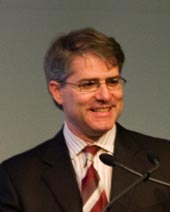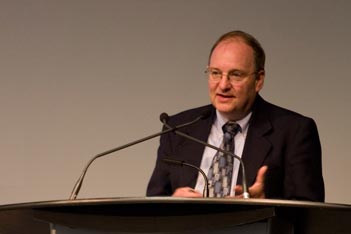Cutting for Cancer
34TH ANNUAL GALLIE DAY 2008
All of our surgical specialties deal with patients with cancer. Members of our Department
of Surgery have an impressive level of research productivity in this area. In the
past five years, our faculty had close to 500 peer reviewed articles published on
cancer research. This included publications in the highest ranked journals, such
as Nature and the New England Journal of Medicine.
This work has improved the way we diagnose and treat cancer. As such, it is fitting
that the theme for this year's Gallie Day was cancer research. The day included
a symposium entitled "Cutting for Cancer: A Role for Surgeons in Oncology Research."
This symposium posed the questions: (1) do surgeons make contributions to cancer
research, and (2) will cancer research make surgical management of cancer unnecessary?
Steven Gallinger (General Surgery), Abhijit Guha (Neurosurgery), Robert Nam (Urology),
and Jay Wunder (Orthopaedic Surgery) discussed their research work in cancer, clearly
demonstrating that surgeons make substantial contributions to cancer research. They
gave eloquent talks about new advances in genetic predisposition to gastro-intestinal
and prostate cancers, mouse models in brain cancer, and developmental signaling
pathways in musculoskeletal tumours. Introductory remarks discussed the complexity
of biologic systems, and similarities of predicting biologic outcome to predicting
the weather. Applying mathematical principles of predicting outcome in complex systems
(chaos theory), it is clear that small changes can still lead to oncologic changes
in cells, despite the ability to modulate many of the pathways important in initiating
or maintaining neoplasia. This suggests that while these research advances will
improve cancer outcome, surgeons will still be needed in cancer management, for
the foreseeable future.

Richard Reznick, R.S. McLaughlin Professor and Chair
|

Benjamin Alman, Vice Chair Research
|
The exciting advances in cancer research from our department were complimented by
the Gordon Murray Lecturer, Randy Rosier, Professor of Orthopaedics and Rehabilitation
and Senior Associate Dean for Clinical Research, University of Rochester Medical
Center, Rochester, New York, who gave a fascinating lecture entitled: "Bench to
Bedside and Back: Translational Journeys in Surgery." He demonstrated how clinical
findings lead to a line of basic science research, which then resulted in the development
of new therapeutic approaches. This clearly showed the importance of surgeons engaging
in fundamental research to drive improved patient care. Randy ended the talk by
discussing the ingredients necessary to continue a productive surgeon-research enterprise,
some of which he has reviewed in a recent publication (Clin Orthop Relat Res. 2006
Aug; 449:159-64).
|
There was a change in the format of the talks by trainees, in that both members
of the Surgeon Scientist Program and non-residents training with our departmental
faculty members gave platform presentations. There were 10 platform presentations
and close to 50 poster presentations. Both the Gallie Bateman Awards (for Surgeon
Scientist Program participants) and McMurrich Awards (for any trainee working with
a member of the faculty of surgery) were judged from both platform presentations
and poster presentations.

Randy Rosier
|
The diversity of the topics and types of trainees highlighted the variety and high
quality of the research being conducted in our department. There was a much larger
than usual attendance, and for much of the day there was a standing room only crowd.
|